.
The Portuguese island of Madeira, a ‘pearl of the Atlantic’ situated 850 kilometres west of Marrakech, is known as a place for people who like to walk. Retired hiker types from northern Europe flock here year-round to trek the levadas – an ancient and seemingly endless network of irrigation channels that criss-cross the island. The levadas flow between high mountain peaks, through banana and eucalyptus groves, and up on the wild north of the island through the primeval, UNESCO-protected laurel forest that at one time covered much of southern Europe. The trails are mostly flat, making them surprisingly easy to walk: they transport water, and water doesn’t like to travel uphill. It’s all so beautiful, beautiful, the visitors say. ‘Come to walk!’ the tourist brochures say. Walk walk walk, levada levada levada. And flowers.
That’s all fine, but it’s not my Madeira. I’m a dedicated pedestrian and academic (possibly in that order), and I’ve lived on this island for the past three years. I don’t do a lot of levada walks unless friends are visiting, but I get my share of exercise. I move around almost exclusively on foot, except when I buy groceries and take a taxi home. What I mostly see of Madeira are the streets of the capital, Funchal. To walk in Funchal is to walk almost constantly at a slant, on a near-vertical slope. Since settlement in the fifteenth century, the city has gradually climbed up the side of the steep volcano whence Madeira was born. Nearly every house, including mine, enjoys stunning views across the Bay of Funchal. This distinct and dramatic urban landscape, seen from street level at walking pace, is the Madeira I inhabit.
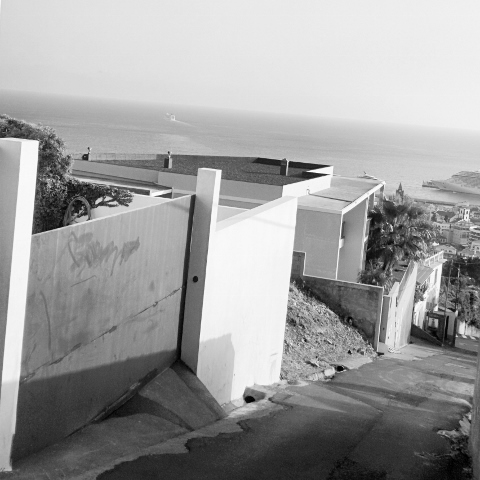
Taxis have trouble reaching my house. When I tell them the name of my street, they mutter under their breath and slap the dashboard of their ancient canary-yellow Mercedes-Benzes. Most drivers already know me: I’m the tall estrangeiro, the One Who Walks, the non-tourist who cabs it. Funchal is a small city; I think a lot of people know me this way. My boss told me that his father once pulled him aside and asked, ‘Nuno, are you paying the new estrangeiros enough? I often see the tall one in glasses walking by the side of the road – like a stray dog!’ My boss explained that the foreigner liked to walk, though I’m not sure he understands it either. When I walk home from work, the last stretch up to my street has me bent so far forward that I can reach out and touch the ground in front of me. People driving past eye me with a blend of suspicion and pity; a couple of the friendlier ones have stopped to offer me a lift.
It’s a typical weekday morning and I’m standing in a ditch by the roadside. I’m thinking of Samuel Beckett, whose characters I remember were always hanging out in ditches – just hanging out, their lot being simply to represent our debased state as human beings. I can relate to this. I lean back and press myself against the dirty wall, my feet deep in cast-off drink containers, as a bus passes inches from my face. There is a blast of exhaust-filled wind and a deafening noise as the bus shifts up to the next gear, then silence. The sky is a high, hazy blue and I’m on my way to work. I step out of the ditch and continue along the single-lane bidirectional road with houses like walls, no sidewalks or trees or grassy boulevards. If I reach out with my broad wingspan I can almost reach both sides.
Parked cars are a huge pain in the arse. I’m tempted to key the car blocking my path, a BMW that’s far too big for such a small island. I even fantasize about walking right over the top of it – I could do it! But instead I wait for a break in the morning rush hour traffic, the cars taking turns to go around it. Even on roads with sidewalks it is difficult and dangerous to be a pedestrian. Cars use the sidewalks as parking spots; somehow they’re immune to ticketing, it’s a populist government and everyone drives. So pedestrians – me, the One Who Walks – are forced to walk on the road. Sometimes I squeeze my passive-aggressive body between the parked car and the wall, snapping in the wing mirror as I pass. Often there are people sitting in these parked cars, why I’ll never know. They’re always playing Candy Crush. My defiant mirror-folding gesture is lost on them. They either ignore completely my body squeezing past their window, refusing to look up, or they act like I’m crazy, like I’m in their space. Hey pal, careful with that wing mirror!
I’ve had some minor altercations. Once I broke the wing mirror off a parked car – it was already taped up, I hardly touched it – and the woman yelled at me as she opened her door a crack to snatch the mirror back from the ground where it lay. Another time it was more serious. I was waiting to cross a busy road, and people kept driving through the zebra crossing. One, two, three cars. When the fourth car approached I started to step out, to signal that it was, in all fairness, my turn to cross. The guy kept driving through at high speed, nearly hitting me. As he drove past me I lifted my leather satchel in a way that was half defensive, half threatening. He was so close that it made contact and clipped the wing mirror – oh those wing mirrors! The mirror came right off. (The satchel was full of books.) There was a loud crack and it went sailing through the air and landed with a tumble, skidding briefly along the road. The Fiat Panda screeched to a halt. The guy was nineteen or twenty, wearing cut-offs and a Cristiano Ronaldo haircut, and he jumped out and started cursing me in Portuguese, calling me the son of a whore. If we had been in North America I might have been worried, like afraid he’d pull out a gun or a bat. But I was twice as big as the guy, if rather willowy and professorial looking, and when I swore back at him in English and shook my satchel full of books he jumped in the Panda and drove off, waving his fist in retreat. I crossed the road.
Every morning I start my commute walking straight downhill. I often break into a run because the incline is so steep. Suddenly I’ll hear a car and flatten my body against the wall as the driver passes with a blank stare or an absentminded wave. After fifteen minutes downhill it levels out for a bit and then I usually put in my earbuds and start back up another hill to get to the university. It’s great exercise – so much that I crave it restlessly when I work from home. But I also go through a lot of shoes, stripping the soles right down to my socks every few months.
Being a pedestrian in Madeira is all about humiliation. It’s impossible to ignore, a nagging voice you can’t drown out with the loudest music or the most engrossing podcast. I remember spotting a fellow academic once when I was walking home from the university, a visiting lecturer from MIT. He wore a thick red beard and spectacles and earbuds like me, and he was walking in the opposite direction. I gave him a hail-fellow-well-met but he didn’t notice. He was evidently deep in thought, taking long strides, and he paused to step into the ditch when a bus drove past. Here was my doppelganger; my own humiliation externalized.
So why do I walk? I’m a grown man, with a decent job, and yet just the other day some moron in a Peugeot sprayed me with wiper fluid. Why do I spend my mornings and evenings walking along the gutter – breathing diesel exhaust, dodging dog shit, stepping over abandoned pairs of underpants – instead of cruising the winding roads in a climate-controlled Audi A3 like my colleagues? I’m not cheap; I’m not particularly sporty either. I don’t climb mountains and I’ve never kayaked. What’s wrong with me? Am I afraid to drive? Am I a masochist with psychogeographic tendencies?
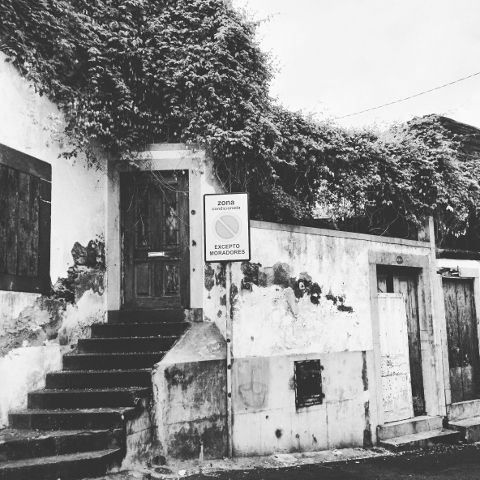
For a while, until I thought better of it, I had considered calling this essay ‘Foreigners, Deficients, Dogs’ – in the end I worried it might be taken the wrong way. I was riffing on the infamous ‘No Blacks, No Irish, No Dogs’ sign that used to hang in lodging house windows in Britain. (I happen to be Irish as well as Canadian.) The use of the offensive-sounding term ‘deficient’ was meant to be an ironic commentary on the Portuguese word deficient that is still used to label people with various mental or physical challenges. Although I see almost no other pedestrians on my morning commute, every morning I walk past two guys with Down’s Syndrome at different points in the journey. They both look about my age, and they possess the same determined, slightly harried look of the pedestrian in a hostile landscape that I must also wear as I walk along the ditch. This being southern Europe, one guy is always smoking; the other guy shouts a loud ‘Bom dia!’ just at the moment he passes me, and I shout back to him over my shoulder. The ‘dogs’ in the hypothetical title were a reference to the packs of stray dogs that I pass every day: usually six or eight in a gang, oddly laid-back and unintimidating despite their size and number, some of them limping after run-ins with cars. The foreigner, of course, is me – and the visiting lecturers who don’t know that nobody walks in Madeira. On this island, we are on the margins – quite literally – while drivers occupy the central space.
There are really two questions I ask myself most days: ‘Why do I walk?’ and ‘Why do I live in Madeira?’. Sure it’s sunny here, but so is San Francisco. After years of living in Madeira my Portuguese is still pretty terrible. Am I afraid to compete in the great northern cities of industry? Perhaps, although I’m fairly certain I could get a job elsewhere. There must be more to it.

If I dig deep, I think it’s that I love the contrast – between the breathtaking beauty, the tropical flowers and sun and sea on one hand; and the plague of traffic and stupidity and all kinds of human failings, which are universal failings, on the other. Anyone who has travelled in southern European cities like Athens or Barcelona or Naples, not to mention the cities of the global south, knows this contrast and its peculiar frisson. Something about the ugliness and beauty of human life, the union of pain and pleasure, is ultimately why I live here and why I walk. I like things to be difficult. I don’t want to be insulated from the pain any more than I already am; I don’t want a life of easy pleasures. Before I moved here I lived in Vancouver and found it depressingly dull, so polished and sensible and fit. I don’t want to give up the hard pleasures that you earn by seeing the world at street level: I want to see what people in cars never see, and breathe the air they don’t have to breathe – even if it kills me.
— by Julian Hanna
(Photos by Simone Ashby. To see more, visit Instagram @tar_island.)
.
Julian Hanna was born in Vancouver and is currently self-exiled on the island of Madeira. His research on modernism and digital storytelling appears regularly in academic journals; his creative writing has appeared in The Atlantic, 3:AM, Flash, Minor Literature[s], Cine Qua Non, and elsewhere. Find him on Twitter @julianisland.
.
.
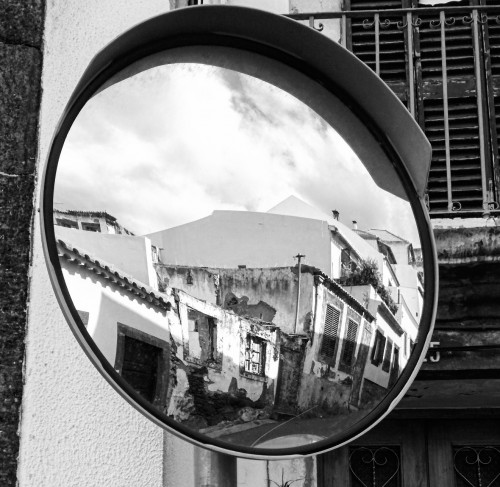
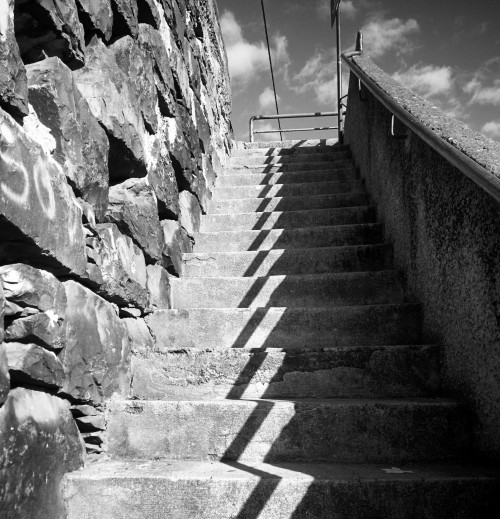
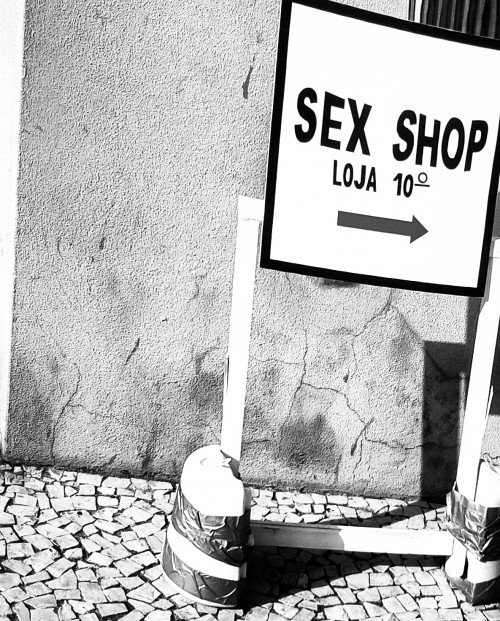
This is a wonderful piece.
Love your piece Julian. I am also a walker by choice (albeit in a place that is very pedestrian friendly), and I also love to observe my city from ‘ground level.’
Wonderful text. Being native from Funchal, it is so easy to relate and recognize the sights and smells.